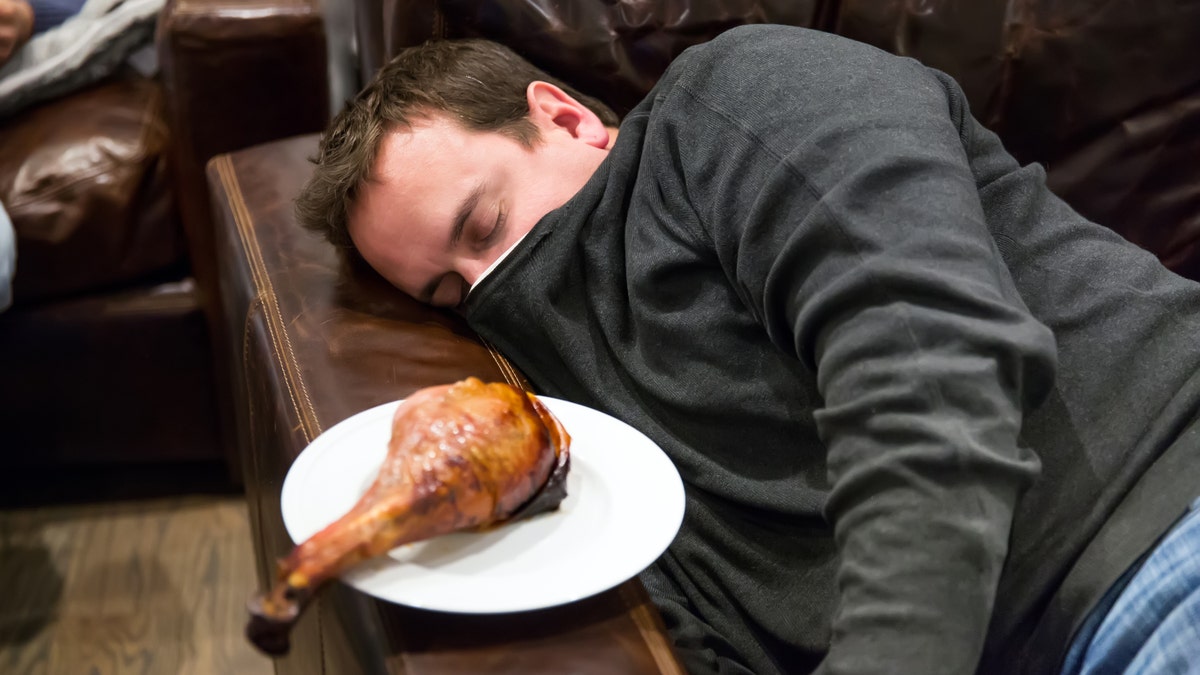
A Caucasian man takes a nap in a comfortable leather chair after eating too much for Thanksgiving dinner. A turkey leg sits on a plate on the armrest. Shot with Canon 5D Mark 3. rm (Jodi Jacobson)
The “food coma” is a well-known phenomenon. Who hasn’t taken a seat at the Thanksgiving table, eaten their weight in sweet potato casserole, and promptly fallen asleep in front of the TV?
It seems the after-dinner snooze effect is real, but scientists still don’t know exactly why or how stuffing our faces leads to sleepiness. Now, a recent study on fruit flies offers some potential clues.
Turns out fruit flies like to nap after eating, too—especially when they’ve eaten meals meals high in protein or salt, or meals that are just extra large.
RELATED: 7 Secrets of People Who Bring Their Lunch to Work Every Day
The study, published in the journal eLife, is the first time “postprandial sleep” (the scientific name for a food coma) has been studied in fruit flies. It’s unknown whether the findings would apply to humans—but at the very least, they’re likely to shed new light on the overall relationship between eating and sleeping, the authors wrote.
To examine that relationship in fruit flies, researchers from the Scripps Research Institute recorded and analyzed the insects’ food consumption and motion, noting that flies tended to sleep for 20 to 40 minutes after eating. Those who ate bigger portions, and those who ate protein-rich or salty solutions, generally slept the longest. (Foods high in sugar didn’t have as big an effect.)
RELATED: 12 Ways to Burn Fat Without Setting Foot in the Gym
The researchers also looked for specific areas in the brain that were responsible for these prolonged naps. “By using genetic tools to turn neurons on and off in the fly brain, we were surprised to find a number of circuits that play a role in controlling this behavior," said lead author Keith Murphy, a Scripps graduate student, in a press release.
Some of these brain circuits also appeared to be sensitive to the fly’s internal clock, as post-meal sleepiness happened less around dusk than at other times of day. It’s “fun to speculate” what the biological reason for this might be, says researcher William Ja, PhD, associate professor of metabolism and aging at Scripps’ Florida campus.
“Maybe it's so that they can continue foraging and accumulating nutrients before sleep,” Ja told Health. “Or maybe that's a peak time for birds and frogs and other insect eaters to come out, so sleeping at dusk would be especially vulnerable for the flies.”
RELATED: 31 Healthy Holiday Desserts
Ja says this discovery may eventually have implications for people, as well: It suggests that food comas are a unique type of sleep, driven by mechanisms independent of other types of shuteye.
“If that’s true in humans too, that means there are potentially different targets for us to go after in the future with dietary or drug interventions to help with sleepiness or wakefulness,” he says.
Studies on post-meal sleepiness in humans have been hit-or-miss, he adds; some have found an effect, but others haven’t. And while salt and protein have been shown to influence sleep or sleep-related hormones in people, those impacts haven’t been studied during a specific time period after eating.
Ja says the fruit-fly research “provides a starting point for future studies aimed at uncovering the exact genes and circuits that enable meal size, protein, and salt to drive sleep.”
He and his team also hope to learn more about why, exactly, post-meal naps are necessary—especially since, for animals in nature, sleep is such a vulnerable state.
RELATED: 5 Signs You’re Not Getting Enough Potassium
“For me, the interesting question is, if you believe food coma is a real phenomenon and happens not only in flies, but in mammals and people too, then it must serve some important biological function,” he says.
“Maybe it's just for good digestion. Or maybe running around with a stomach full of food is just horribly damaging for your gut,” he continues. “Whatever the function is, do we really want to go around avoiding it?”
That said, if you don’t want to find yourself out of commission (or too sleepy to drive) after dinner on Thanksgiving, Ja says the age-old advice likely still holds true. “Eat in moderation and graze over a longer period, rather than gorge over a short time,” he says.







































